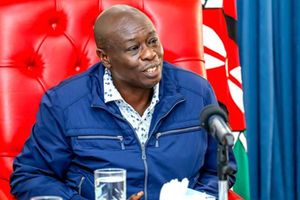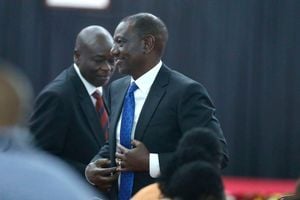Ruto minister Njuguna Ndung'u suffers opposition walkout in his first budget
Kenyan President William Ruto's government presented its maiden budget to parliament on Thursday but was met with a walkout by protesting opposition MPs.
Speaking outside Parliament, the opposition MPs said their action was prompted by the budget itself, which they said did not address the concerns of ordinary citizens.
"Azimio does not believe in this budget. We don't think this is the budget for the Kenyan people, it's a budget for the Kenya Kwanza government," said Suna East MP Junet Mohamed.
The National Assembly Minority Leader said the opposition MPs will push for amendments at the third reading of the Bill.
The 3.6-trillion shilling ($25.7 billion) financial plan for 2023/24 is the first since Ruto took the helm of the East African powerhouse in September last year following a bitterly contested election race.
But there has been widespread public anger over plans for a raft of tax hikes including on food and fuel expected to generate an extra $2.1 billion in revenue.
And just as Treasury Minister Njuguna Ndung'u began reading the budget, lawmakers allied with opposition leader Raila Odinga's coalition walked out of the chamber to cheers and jeers.
Although Ruto pledged on the campaign trail to help poor Kenyans known as "hustlers", he has been accused of introducing policies that have actually made their lives harder.
Ruto is seeking to replenish the government's coffers and repair a heavily-indebted economy inherited from his predecessor Uhuru Kenyatta, who splurged on major infrastructure projects.
"We have to have some short-term sacrifices for us to achieve the long-term. We have to sacrifice for the future," Ndung'u told local station Citizen TV earlier on Thursday.
Feeling the pinch
Kenyans are already feeling the pinch from soaring prices for basic necessities, along with a sharp drop in the value of the local currency and the worst drought in four decades.
Economic growth slowed last year to 4.8 percent from 7.6 percent in 2021, reflecting the global fallout from Russia's invasion of Ukraine and the drought buffeting the vital agriculture sector.
Kenya is also sitting on a public debt mountain of almost $70 billion or about 67 percent of gross domestic product (GDP), and its repayment costs have jumped as the shilling sinks to record lows of more than 139 to the dollar.
Ruto has said that the finance bill, which sailed through a second reading in parliament on Wednesday, will ease the debt burden, stimulate the economy and create jobs.
But opponents have warned the new measures will further hit people already struggling to make ends meet as the cost of living crisis bites.
Significant challenges
The proposed legislation calls for new or increased taxes on items including fuel and food, as well as mobile money transfers, beauty products and digital content.
One of the most contentious provisions is a 1.5 percent levy on the salaries of all tax-paying Kenyans to fund an affordable housing programme.
Odinga's Azimio alliance had on Wednesday described the budget as "deeply flawed" and said it "prolongs and worsens the suffering of the people".
Earlier this year, the opposition staged several anti-government protests over the cost of living crisis which degenerated into sometimes deadly street clashes between police and demonstrators.
An opinion poll published in the leading newspaper Daily Nation on Wednesday found that 90 percent of Kenyans were opposed to the finance bill.
The International Monetary Fund (IMF) has nevertheless hailed the government for responding "promptly" to the economic challenges it faces and for "prudent" spending.
In May, the IMF said it had reached a preliminary agreement with Kenya that would provide the government with access to another $1 billion in credit -- increasing its total commitments to $3.52 billion.
While the agency said it had a favourable medium-term outlook for the Kenyan economy, "significant challenges remain against the backdrop of slow global economic growth and tight financial conditions".






